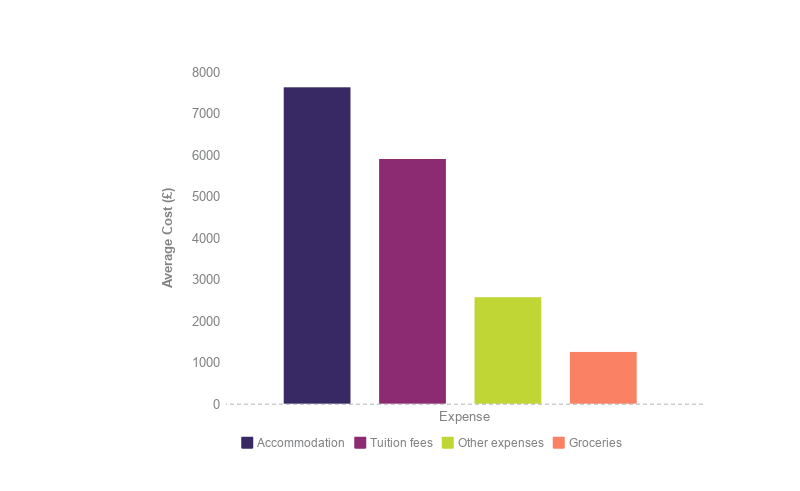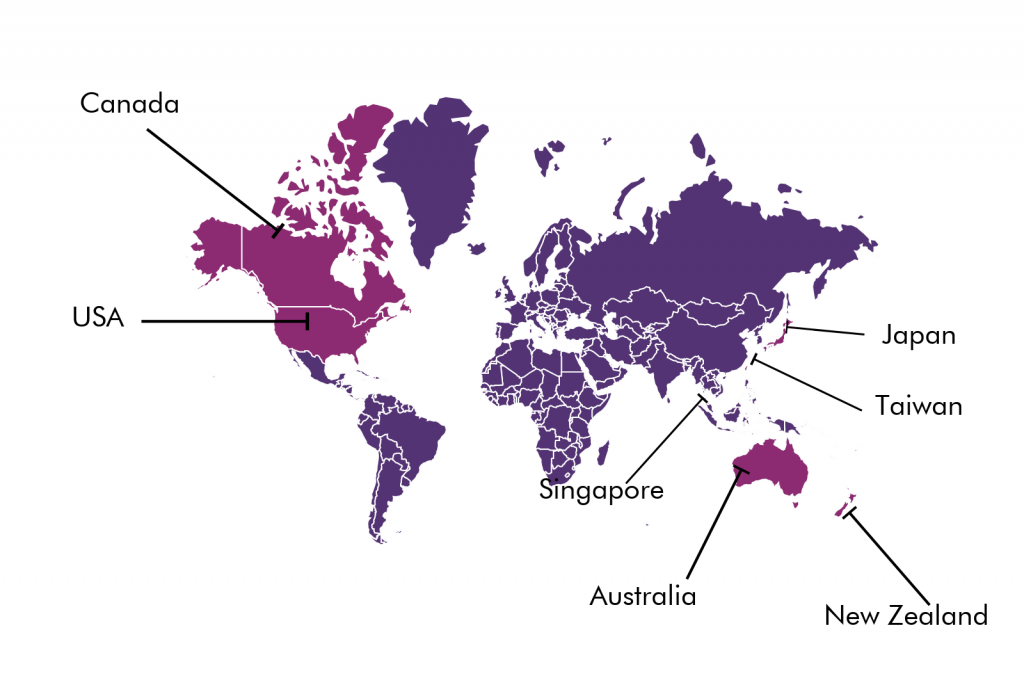What to Do After University – Your Options Explored


I have no idea what I want to do with my life!
Do those words sound familiar? You’re not the only one.
The New Year brings anxiety for final year students everywhere. Graduation is creeping up on you and finals are just around the corner. Your housemate’s just landed her dream graduate job and that guy on your course won’t shut up about the amazing gap year he’s got planned backpacking around Brazil. Meanwhile, it feels like the only certainty in your life is that you have no idea what to do with it after graduation!
Well, don’t worry because whether you’ve just graduated or you’re finishing university this year, it’s quite normal to be panicking about what to do after uni. Life after university is full of new challenges and difficult decisions, and with so many options and careers available it’s never easy to decide on a path to follow and set your after university plans in stone.
Here at Andrew Chell Premier Student Homes, we’ve designed this comprehensive guide which is full of detailed advice to help you make those important decisions. We’ll talk you through a variety of different options for what to do after graduation, including graduate jobs and careers, postgraduate study and gap years for those who want to spend some time travelling after university.

– Contents –
Graduate Schemes | Other Graduate Jobs | Alternative Routes to Work
Master’s Degrees & Postgraduate Study
What is a master’s degree? | Types of Postgraduate Study | Funding Postgraduate Study
Taking a Gap Year After University
Should I Take a Gap Year? | The Personal Benefits of Travel | How to Fund a Gap Year After Uni
Getting a Job After Uni
Amongst every cohort of final year students, there’ll always be a few who’ve landed coveted places on a grad scheme months before the reality of leaving uni has hit anyone else.
At the same time, there’ll be many who have no idea what sort of job they want or which career to pursue long after finals have ended.
No matter which category you fall into, we’ve got some great career advice and options for graduates to help you find a job and decide what you want to do after uni.
Graduate Schemes
Grad schemes are often seen as the holy grail of graduate jobs.
These schemes are often provided by large, well-known employers and generally offer a two to three year fixed contract with extensive training schemes. They’re also some of the best paid graduate jobs. There are often plenty of perks included too, such as company cars or phones. You’ll normally get the chance to experience different areas of a business over the course of a scheme.
Some of the most popular and well-known schemes include those offered by businesses like Aldi and Deloitte, as well as the government’s Civil Service Fast Stream. They’re often a fantastic way to get your feet on the career ladder.
However, they’re incredibly competitive, with only 14% of applicants securing a place on such a scheme. Plus, the application process is lengthy and often consists of several stages, including an initial application form, psychometric testing, phone or video interviews and assessment days. You’ll have to excel during every stage to get a final interview.

Pros
Cons
- Lucrative Salaries – e.g Aldi pays £44,000 per year.
- Reputation and prestige – joining a graduate scheme at a big name company looks great on your CV.
- Great training and development opportunities
- Opportunities for travel
- Job security for the duration of the scheme
- Plenty of perks and benefits
- Not guaranteed a job at the end of the scheme
- Very competitive with a gruelling application process
- Not available for all industries – most common in finance, IT and retail.
- Can be hard to broaden skills beyond role
- Very corporate environments don’t suit everyone.
Other Graduate Jobs
Graduate schemes aren’t the only jobs available to graduates. There are far more regular graduate jobs that aren’t in the form of a formalised scheme.
Not every business runs a grad scheme, so graduate jobs are far more numerous and are available across businesses of all sizes, from the tiniest startups to huge corporations. They’re commonly advertised by SMEs (small and medium sized enterprises).
These businesses are naturally still looking for high-calibre graduates, but there’s no fixed length contract and you won’t be following a structured scheme. Unfortunately, pay does tend to be lower than what’s offered on graduate schemes.
However, application processes are far shorter and they’re available all year round, whilst grad schemes have shorter application windows – normally at the beginning of the academic year.
Pros
- Smaller, closer teams
- Available across all sectors
- More hands-on experience
- You’ll make a more noticeable impact on the business
- Roles are often more varied
Cons
- Lower pay
- Fewer and less structured training opportunities
- Less structured career paths and progression
- Lower job stability, particularly at start-ups and very new businesses
Alternative Routes to Work & How to Figure Out What You Want to Do For a Career
If your well-meaning relatives are to be believed, having a degree should naturally mean you can get any job you want fresh out of uni. But in an ever-changing world of work and a volatile economy, it’s just as likely that you’ll be thinking “I don’t know what job I want” with no clue on how to figure out what you want to do for a living.
However, it’s totally normal to have no job after graduation. If you have no idea what type of job you want, it can be helpful to spend some time figuring out exactly what you want to do and really consider your options after university. This is often a better idea than jumping into the first job that you can get and hating everything about it.
In fact, if you get a job offer and find yourself thinking “should I take the job or wait for something better?”, pay attention to your gut feeling. There’s a chance it’s just not the right role.
Part-time jobs
Taking a part-time non-graduate job can be helpful as you can earn some money after graduation, especially as your student loan will be a thing of the past. It’s quite common to feel mentally exhausted after finishing university and you might actually appreciate some time out before starting your career properly. It also lets you build up experience to talk about on your CV and in interviews.
Graduate Internships
You could also apply for internships in industries you’re interested in. You might be wondering “can you still do internships after graduation?” but don’t worry because you definitely can!
If you’re struggling to find a job after university, internships can help you gain relevant experience and skills and boost your resume, as well as test the waters in different companies and industries. Plus, if you enjoy the job, there’s a chance that an internship could turn into a fulltime position anyway.
Postgraduate Study: Master's Degrees and More
Not quite got your fill of higher education yet? Consider going back to college after graduating to undertake postgraduate study such as a master’s degree.

What is a Master's Degree?
A master’s degree is a postgraduate qualification that demonstrates advanced knowledge and learning in a particular subject area. It’s the first level of graduate study after completing an undergraduate degree.
A master’s course takes between one and three years to finish, depending on whether they’re studied fulltime or part-time.
Further study such as master’s degree has a range of benefits, as well as some downsides that are worth considering:
Pros of Postgraduate Study
Cons of Postgraduate Study
- Bolsters your employability and salary prospects
- Helps you to develop a deeper understanding of your degree subject and explore new aspects
- Prepares you to progress on to a pHD and academia
- Allows you to pursue new and interesting career paths
- Helps you to hone and refine your research skills and critical thinking
- Expensive – the average full cost of a postgraduate degree is £17,000 per year.
- Intensive workloads
- Delays the start of your career and earning money
- Funding can be hard to secure
Types of Postgraduate Study
Not all postgraduate degrees are structured in the same way and it’s worth taking your time to think over your options. What do you want to get out of further study? What are your future plans and ambitions, and how will a postgraduate degree help you along the way?
Taught Master's Degree
Taught master’s degrees will be more familiar to most graduates, as like undergraduate degrees they’re taught in modules via lectures, tutorials, seminars and lab classes. You’ll also have to carry out some independent research, normally in the form of a dissertation or extended essay. When undertaken on a fulltime basis, these degrees usually last a year.
Research Master's
A research master’s, or Master of Research (MRes) degree moves the focus away from classes and lectures, instead emphasising independent research skills.
These degrees train you to research effectively and therefore they’re fantastic preparation for a PhD. Equally, they can be a good option if you’re looking to embark on a career that requires honed research skills. You can develop them in a year, rather than the 3 years it would take to complete a PhD.
Professional Qualifications and Diplomas
Did you get to the end of your degree and realise that you want to do something else entirely?
Certain postgraduate qualifications such as the Graduate Diploma in Law (GDL) or Postgraduate Certificate in Education (PGCE) give you the chance to pursue a career path without the relevant undergraduate degree. For example, the GDL gives those who didn’t study law at uni a ‘fast-track’ route to become a solicitor or barrister.
PhD
A PhD is the most advanced type of postgraduate degree. If you’re looking for a career in academia or research, this is the way to get there.
A PhD revolves around three years of independent, original research. This ‘thesis’ won’t just help you get a degree either – it should develop new knowledge, understanding and approaches in your field as a whole. At the end, you’ll have to defend your research in an oral exam commonly known as a ‘viva’. If you’re successful, you’ll get the shiny new title of ‘doctor’ conferred on you.
Funding Postgraduate Study
Postgraduate degrees can be very pricey and funding them can be a source of stress for many graduates. Take a look at how the average costs break down per year:

Luckily, in recent years the options for funding a master’s degree have improved, with the introduction of government loans for graduates. Plus, there are a range of other private loans, bursaries and scholarships available to help you get your studies underway.
Postgraduate Master's Loan
In 2016, the UK government introduced Postgraduate Master’s Loans. These aren’t quite the same as an undergraduate student loan as you don’t get separate loans for fees and maintenance. Rather, you’ll get a single loan of up to £10,280 to cover all costs. Like your undergraduate loan, it will be paid in three instalments over the course of the academic year. It will also be paid back with your undergraduate loan, once you earn over £21,000.
If you do choose to take out a master’s loan, remember that this must be your only source of funding.
→ Visit the government’s page on master’s loans
Scholarships and Bursaries
Bursaries and scholarships are non-repayable grants given to students by universities, companies or the government.
Bursaries are granted to students on specific courses, those who have proven financial need and under-represented groups.
Scholarships are often granted on the basis of academic excellence. Although you don’t have to pay them back, there may be other conditions attached.
For example, a business that has funded your postgraduate degree might insist that you work for them for a set period of time after completing it.
Professional and Career Development Loans
If you need more money to pay for a postgraduate degree, professional and career development loans are low interest bank loans that can be used to pay for courses and trainings. You can borrow between £300 and £1000, with the option to pay it back over 12-60 months or all at once.
Research Council Funding
There are seven Research Councils in the UK which grant funding for different fields of research. Every year, they offer 8000 non-repayable ‘studentships’ which financially support students through postgraduate study.
- Fees-only studentships cover the cost of tuition fees.
- Full studentships also include an annual stipend to help with living costs, which you won’t have to pay back.
Taking a Gap Year After Uni
It’s perfectly understandable to want a break after all your hard work, and taking a gap year after uni can be an enriching way to do this.
Should I Take a Gap Year?
Many people worry that taking a gap year after university will negatively impact their chances of getting a graduate job later. But it’s worth remembering that a year out is more likely to have the opposite effect.
Spending a gap year travelling and exploring the world will expand your horizons and you don’t necessarily just have to swan around either (although we wouldn’t blame you if you did!) You could use your gap year to:
- Volunteer
- Learn a new language
- Gain international work experience
It’s clear that travelling after uni isn’t a waste of time. It’s a great chance to try new things, which will increase your range of experiences and your employability. You’ll likely come back from your year abroad a far more desirable employee and feel more prepared to enter the world of work.
The Personal Benefits of Travel
You might have spent your entire life in education so far, but you’ve probably still got a lot more to learn. Travel will boost your personal development, with benefits including:
- A chance to see and learn about more of the world
- It’s a cliché, but you might genuinely “find yourself” – or at least learn something about yourself that you didn’t!
- Helps you to develop tolerance and intercultural understanding
- Builds confidence and independence
- Memories to last a lifetime

How to Fund a Gap Year After Uni
A lot of graduates are put off the idea of travel by the costs involved – booking flights, finding accommodation and even the costs of day to day living in a foreign country all add up, and that can make the prospect of a gap year seem unaffordable.
That said, it’s worth mentioning that most graduates who take a gap year after university don’t necessarily spend the entire twelve months travelling. Instead, it’s common to take a part-time job pulling pints in a bar or stocking shelves to get some cash together.
Even better, you could try and find a paid three or six month internship and enjoy a twofold advantage – you’ll have money to travel, and relevant work experience to help you find a job when you return.
As we’ve mentioned, you could also work abroad, which is a brilliant way to fund your adventures and see the world at the same time. One way to do this is to spend time travelling around a country that offers Working Holiday Visas. These visas give you the ability to travel around a specific country, whilst also earning cash to supplement your funds. Countries such as Australia, New Zealand, Canada, China and Japan (among many others) all offer these visas to UK citizens between the ages of 18 and 30.
Working Holiday Visa Map for UK Citizens
The following countries offer working holiday visas to UK citizens:
- USA
- Canada
- Singapore
- Japan
- Taiwan
- Australia
- New Zealand

Final Thoughts
We hope this guide has provided an overview of the options available to graduates and that you feel more confident about the paths you could follow after university.
On a final note, it’s worth remembering that the graduate blues and post-university depression are real threats to your health. A lot of graduates feel low leaving their friends and university city behind and moving back in with their parents. Pay attention to your mental health after graduating and seek help if you need it.
But, no matter your plans (or lack thereof) try not to panic in your final months at university. You’ve got the rest of your life ahead of you and a lot more time than you think to figure all this stuff out. Who’s to say you won’t be able to try everything on this list?

Andrew Chell can be contacted as follows:
Phone: 01509 552814
Mobile:07769 684800
Email: [email protected]
Office: 66 Ashby Road, Loughborough LE11 3AE
Published 9th March 2018

